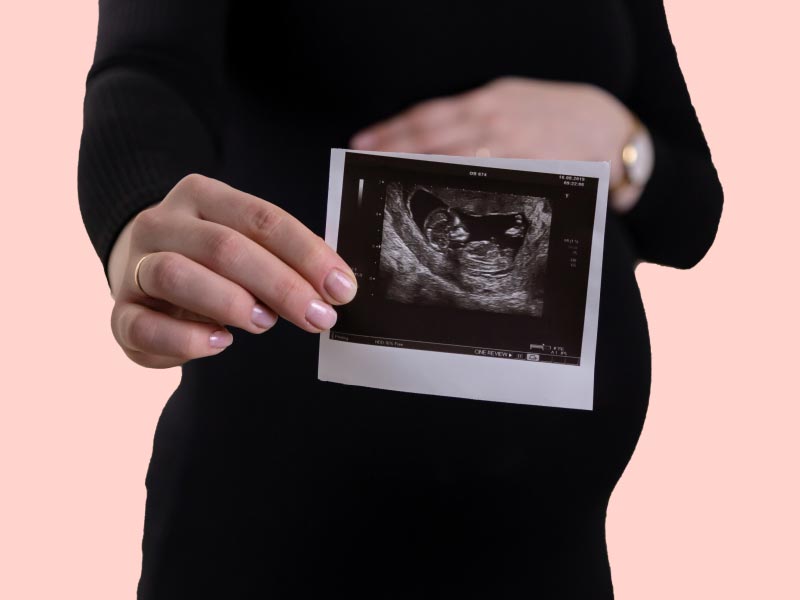
Managing BV
While Pregnant
Published on October 30, 2023
Updated on December 22, 2025
Written by Kathleen Morrison
Medically Reviewed by Andrea Sleeth WHNP-BC, MSCP
Key takeaways
- BV is common during pregnancy, thanks to all the hormonal shifts happening behind the scenes, but it’s also totally treatable and nothing to be ashamed of.
- Symptoms like unusual discharge, a fishy smell, or irritation are worth paying attention to, since catching BV early can help protect both you and your baby.
- Untreated BV can raise the risk of complications like preterm birth or low birth weight, but getting diagnosed and treated quickly can help lower those risks.
- Testing for BV is simple, fast, and usually done with a quick swab; if something feels “off,” it’s always okay to ask your provider for a check.
- Safe, pregnancy-friendly antibiotics are available, and finishing the full course helps keep the infection from returning.
- Small daily habits, like choosing breathable cotton underwear, skipping scented products, staying hydrated, and managing stress, can help keep your vaginal microbiome balanced throughout pregnancy.
Pregnancy is full of excitement, surprises, and (let’s be real) endless questions. Between the cravings, body changes, and doctor visits, you’re also keeping an eye on your health—including things like infections. That’s where bacterial vaginosis (BV) may play a role.
It’s not the most talked-about topic, but knowing how BV can affect your pregnancy can help you make informed choices for both you and your baby. The good news is that BV is common, manageable, and treatable, so a little awareness can go a long way.
The basics of BV and pregnancy
Bacterial vaginosis (BV) is one of those things that can show up without much warning, and while it’s common, it’s obviously still worth paying attention to.
Your body is already working overtime adjusting to hormonal shifts, and those changes can affect your vaginal health, too.
When your natural balance gets disrupted, certain bacteria can overgrow, leading to BV.
Sometimes, it comes with symptoms (like unusual discharge or odor), and sometimes, it doesn’t, but either way, understanding BV can help you take charge of your health during pregnancy.
What causes BV during pregnancy?
BV happens when the natural balance of bacteria in your vagina shifts. Pregnancy can make this more likely because your vaginal microbiome is extra sensitive during this time. BV in general can have lots of triggers, including:
- Hormonal changes during pregnancy
- Douching or using scented soaps that disrupt your pH
- New or multiple sex partners, which can introduce different bacteria
These factors don’t guarantee you’ll get BV—every body reacts differently. But knowing the triggers can help you protect your vaginal health.
If something feels off, skip harsh cleansers, pay attention to any new symptoms, and check in with a healthcare provider. And if you're sexually active with new partners, using a barrier (like condoms) can help prevent unnecessary bacterial shifts.
How BV Can Affect Pregnancy
While BV itself isn’t dangerous, leaving it untreated during pregnancy could increase the risk of complications like preterm labor or low birth weight.
That might sound scary, but the important thing to remember is this: BV is treatable. Catching it early and getting the right medication (usually a simple BV antibiotic treatment) can help keep both you and your baby healthy.
The best move? Keep an eye out for any changes in discharge, irritation, or odor, and mention them at your next prenatal visit. A quick test can confirm if BV is present, and from there, treatment is easy and effective. No stress, no shame—just proactive care that keeps you in control of your health.
BV Symptoms During Pregnancy
Pregnancy is a wild ride—some days, you feel unstoppable, and other days, a nap is the only thing on your to-do list. Add possible infections into the mix, and you’ve had just about enough of it all.
Being able to recognize BV symptoms early on can help you take the guesswork out of the equation and help you get the care you need, fast, and move on with your life.
How to Spot BV
The most common sign of BV is a thin, grayish discharge with a noticeable fishy smell—especially after sex or when washing with soap. Some people also have mild itching or burning, while others only notice a subtle change in discharge or scent.
Because pregnancy comes with so many shifts, it’s easy to chalk new symptoms up to hormones. But if something feels off, it’s worth checking. An easy, at-home vaginal test can help you confirm whether BV is the cause so you can get treated quickly.
When to Check in with a Provider
Honestly, if you notice any of the above BV symptoms—unusual discharge, irritation, or a weird smell—it’s worth reaching out to a healthcare provider. A short conversation can clear things up, and if it does happen to be a BV infection hanging around, treating it early can help you avoid bigger issues later in your pregnancy.
Feeling weird about calling the doctor’s office again? No shame in that. Pregnancy is unpredictable, and you deserve to feel confident in your health. Your provider is there to answer your questions, so don’t wait for symptoms to magically disappear—if something’s bothering you, speak up. Taking charge of your sexual health is always the right move.
What Are the Risks?
If you’ve found yourself with an infection, you’re probably wondering whether BV could affect your baby. The short answer is yes, but that doesn't mean you need to panic. Early treatment can help you and your baby get right back on track.
While not everyone with BV experiences complications, knowing the risks can help you make the best choices for yourself and your growing little one. When it comes to your health, staying informed is always a powerful move.
How BV Can Affect Your Baby
Untreated BV during pregnancy has been linked to an increased risk of premature birth and low birth weight. Babies born early may face extra challenges, like difficulty breathing or feeding, since they didn’t get quite enough time to develop in the womb.
Does this mean BV will cause complications? Nope, not necessarily.
But think of it like a check engine light—sometimes, it’s nothing serious, but ignoring it can lead to bigger issues down the road. The good news? Treating the BV infection can lower these risks, so you can focus on the exciting parts of pregnancy, like picking out baby names or feeling those first tiny kicks.
Why Treatment Matters for You
We know you have one major focus right now, but BV isn’t just about baby—it can also impact your own health.
If left untreated, BV has been linked to a higher chance of postpartum infections, which is the last thing you need while adjusting to life with a newborn. Plus, unnecessary stress and uncertainty can make pregnancy feel even more overwhelming than it already is (yikes). Getting ahead of BV will mean fewer "what ifs" and more peace of mind.
If you’re thinking, Maybe I’ll just wait and see, remember that taking action now can help you avoid unnecessary complications later. The best part is that treatment is simple, safe, and one less thing to worry about on your pregnancy journey.
What to Do If You Think You Have BV
When something feels off, you deserve clear answers—especially during pregnancy.
Diagnosing BV early helps you get the proper treatment (if you need it) and avoid unnecessary stress. Testing for BV is quick and straightforward and gives you the clarity you need to feel confident about your next steps.
How BV Is Diagnosed
Healthcare providers usually test for BV by collecting a small sample of vaginal discharge with a swab. That sample gets checked under a microscope to look for imbalances in bacteria.
Sometimes, they’ll also test pH levels or add a chemical to see if a strong fish-like odor appears—one of BV’s signature signs. It might not be the most glamorous moment of your life, but it’s a routine test that can help you get answers fast.
If you’ve noticed any changes like abnormal vaginal discharge, itching, or a smell, let your provider know. The more details you share, the easier it is for them to decide if BV testing makes sense for you.
Do You Really Need a Test?
BV isn’t always included in the usual routine prenatal screenings unless you have symptoms or a history of infections. But if something doesn't feel quite right, don’t hesitate to ask your provider about getting tested. A simple test can give you peace of mind—and if BV is the cause, early treatment makes managing it much easier.
Thinking about handling it yourself with over-the-counter treatments? Hold your horses—BV can be tricky, and DIY solutions might not be as effective (or pregnancy-safe). Getting a proper diagnosis ensures you’re treating the right thing at the right time. Because when it comes to your health and your baby’s, guessing isn’t worth the risk.
Treating BV During Pregnancy: What’s Safe and What Works
BV is very treatable, and luckily, certain antibiotics have been safely used in pregnancy for years. Your provider can help you find the right option so you can focus on feeling good and enjoying this chapter of your life.
Safe Antibiotics During Pregnancy
The go-to treatments for BV during pregnancy are prescription antibiotics like metronidazole and clindamycin. These have been studied extensively and are widely considered safe when taken as prescribed. Research hasn’t linked them to any birth defects, which means you can take them with confidence.
If you’re feeling unsure about taking medication while pregnant, that’s completely understandable! It’s always a good idea to ask your provider about potential side effects, how to take your prescription, or anything else on your mind. They’re there to help—and the sooner BV is treated, the lower the chance of it causing complications down the road.
Why Finishing Your Antibiotics Matters
Starting treatment is step one—but finishing it is just as important. Even if your symptoms clear up early, stopping the medication too soon can leave room for the infection to sneak back in.
If you’re struggling with side effects or worried about anything while taking antibiotics, don’t hesitate to reach out to your doc. Your comfort matters, too, and there’s always a way to make treatment work for you.
Avoiding BV During Pregnancy
Keeping BV at bay is easier than you might think. It all comes down to simple, everyday habits that support a healthy vaginal environment—kind of like routine maintenance for your body. A little care goes a long way in keeping things balanced.
Small Shifts to Make a Big Difference
A few easy swaps in your routine can help lower your risk of BV:
- Go breathable: Opt for cotton underwear to keep things dry and comfortable.
- Skip the scents: Scented soaps, washes, and sprays might smell nice, but they can disrupt your natural balance. Stick with water or a mild, unscented cleanser.
- Rethink panty liners: If you're using them daily, consider giving your skin a break to avoid excess moisture buildup.
- Say no to douching: Your vagina is self-cleaning (seriously!). Douching can throw off the beneficial bacteria that keep things in check, so it’s best to skip it altogether.
Not sure what’s right for you? Your provider can help you fine-tune your routine so you can feel fresh and confident without the guesswork.
Lifestyle Habits for a Happy, Healthy Vagina
Beyond daily care, a few lifestyle tweaks can support vaginal health from the inside out:
- Manage stress: Easier said than done, but stress can cause hormone changes and bacterial balance. Finding small ways to relax—whether it’s a short walk, meditation, or venting to a friend—can help reduce stress and make a difference.
- Stay hydrated: Drinking plenty of water helps flush out toxins and supports your overall health.
- Fuel your body: A balanced diet rich in fruits, veggies, and whole grains can help strengthen your immune system, making it harder for unwanted bacteria to take over.
Taking Charge of Your Health
Pregnancy comes with a lot of changes—some exciting, some unexpected, and some just plain frustrating. If you’re dealing with BV on top of everything else, it’s completely normal to feel a little overwhelmed.
But here’s the good news: BV is common, treatable, and manageable. A quick check-in with your provider, the right treatment, and a few simple adjustments to your routine can help you feel more in control.
At Wisp, we believe that everyone deserves accessible, judgment-free healthcare—especially when you’re growing a tiny human. Having the right support makes all the difference, whether it’s from a doctor, a partner, or a friend who just gets it.
With the right info and care, you can focus less on infections and more on enjoying this wild, beautiful chapter of your life.
Wisp treatment options are available only after consultation with a licensed medical professional. You should consult with your healthcare provider before starting a new supplement or treatment regimen. Individual results may vary.
This blog post is for informational and educational purposes only and should not be taken as professional advice. Always consult with a qualified professional before making any decisions based on the information provided here.




